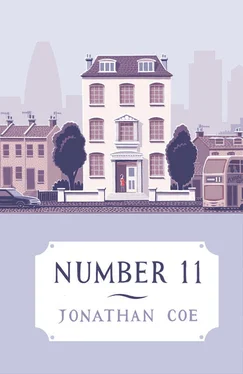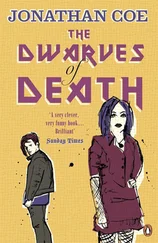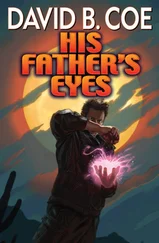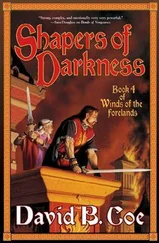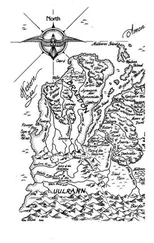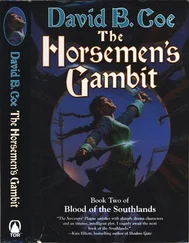… the next thing I knew, I was sitting in the most comfortable armchair in the world, in a room flooded with natural light, where one of the walls was made entirely of glass and looked on to a beautiful, manicured, walled garden, filled with fountains and rose bushes. A lovely piece of gentle classical guitar music was playing in the background. Alison was sitting on a footstool beside me, holding my hand. On a little table next to my chair was a fresh mug of tea, from which I took a sip: it was strong and sweet and deliciously reviving.
‘Where am I?’ I murmured.
‘This is Phoebe’s studio. Great, isn’t it?’
I felt so tired, it was an effort to get even one more word out. ‘Phoebe?’
‘The Mad Bird Woman. Only I don’t think we should call her that any more. Her name’s Phoebe.’
I managed to turn my head and look around the room. It was indeed filled with canvases, easels, paint pots and brushes. There was also a dining table — about half the size of the one in the front room — at which the man from the cellar was sitting, wrapped in a blanket, still playing his game of Pelmanism.
‘Who is he?’ I faintly said to Alison.
‘We don’t know. But we think that his name’s Lu, or something like that, and he comes from China.’
A door opened and Phoebe herself came in. Glimpsing a view of the hall through the open doorway, I realized that the door to this wonderful, light and airy studio must have been the second one that I had tried: the one that had been locked. At this memory, images of my horrific descent to the cellar began flooding back for the first time. I drank some more tea eagerly.
‘How are you feeling now, Rachel?’ Phoebe asked.
‘OK, thank you,’ I said. Was this the same woman I’d been frightened of for the last few days? She seemed so gentle and kind.
‘You shouldn’t have gone down there, you silly girl. You must have given each other a terrible fright.’
I smiled. ‘Yes, we did.’
Over at the table, Lu gave what seemed to be a cry of satisfaction. Going over to look at the progress of his card game, Phoebe put her hand on his shoulder and said: ‘There you are — brilliant! Not a single card missing. You did it.’ To which she added a few broken words in (I suppose) Chinese. Lu turned and grinned at her. At least a third of his teeth were missing, but it was still a nice smile.
‘ W zuòdào le ,’ he said, in a harsh and cracked voice.
‘He’s been playing that game for more than a week now,’ Phoebe explained, drawing up a chair and coming to sit between us. ‘I gave it to him because he seems to have lost his memory and I thought it might help him to get it back. The cards are very old — they belonged to my parents. They’re kind of horrible but pretty easy to remember, at least.’
‘So … what were they doing in the woods?’
‘I can’t keep him here,’ Phoebe said. ‘I can’t hold him prisoner. That’s not the idea. It’s just supposed to be somewhere he can feel safe for a while. He’s free to come and go as he wants. So one evening he went off to sit in the woods, and he took the cards with him. He takes them everywhere, in fact. But I expect he got confused, and forgot them, and left them all behind.’ She smiled at us, and must have seen the confusion on our faces, because now she launched into a fuller explanation:
‘It was in the woods that I found him, about ten days ago,’ she said. ‘It was early in the morning and he was sitting up against a tree and he was so weak that he could barely move. He looked as though he hadn’t eaten for weeks. He wouldn’t come with me so I went home and fetched him some food. Even after that, he was still scared of me and it didn’t help that I couldn’t understand a word he was saying. But I wanted to get him to some sort of safety. I didn’t want to get the police involved because I didn’t think they’d be sympathetic. People in Beverley are pressuring them to crack down on vagrants and I thought that was the category they’d probably put him into.
‘After a while I realized that he did understand a bit of English, and by the end of the morning, I’d managed to persuade him to come home with me. I told him that he was welcome to sleep here for a few days — my guess was that he’d been sleeping rough, I don’t know how long for — but he didn’t want to be in any of the bedrooms, for some reason. The place he really seemed to like was the cellar so I fixed it up for him as best I could, put in a camp bed and a few rugs and chairs and bits and pieces to try and make it more cosy. He seemed happy down there. That was where he wanted to be. Maybe because it made him feel safe.’
‘Why was he so scared?’ Alison wanted to know. ‘What’s he running away from?’
‘Well, unfortunately, I haven’t been able to get much sense out of him,’ said Phoebe. ‘The language that he speaks is Mandarin, I’m pretty sure of that, so he’s come to this country from China. He’s probably come here looking for work, and my guess is that he has been working here, for quite a while. Working very hard, which is why he looks so worn out. I don’t think he’s anything like as old as he looks.’
I had a sudden inspiration. ‘Has he been trafficked?’
Alison and Phoebe both looked at me, equally impressed. I did feel rather proud of myself for being so worldly and knowledgeable.
‘I saw this programme on the television the other night,’ I explained. ‘Apparently there are slaves in England. Real slaves. Most of them come here from other countries and they have to work, like, twenty-four hours every day and if they try to run away they get beaten up or attacked by dogs.’
‘I don’t know if he’s been trafficked,’ said Phoebe, ‘but I think he has been doing some kind of forced labour. There aren’t many clues, because he doesn’t have a passport with him or anything like that. Probably his employer’s got it. But he did have this in his pocket.’
She showed us a slip of paper. It was a handwritten payment slip, scribbled out on cheap blue headed notepaper. The name of the company at the top was ‘Sunbeam Foods’.
‘Sunbeam Foods?’ said Alison. ‘Who are they?’
‘I did some research on the internet,’ said Phoebe. ‘They’re a food-processing company, based down in Kent. Outfits like this send cheap labour to farms all over the country. So it looks like Lu’s been working for them. And I’ve got a pretty good idea what he might have been doing. There was one word that, when I mentioned it to him, completely freaked him out. It was chickens .’
At the mere sound of the word, Lu turned sharply towards us, panic etched on his face.
‘ Chickens ?’ he said. ‘ No. No chickens .’
Phoebe got up and comforted him, rubbed his shoulders, soothed his brow. ‘No chickens,’ she kept saying, until his agitation had subsided. ‘It’s all right, Lu. No chickens. No chickens for you.’
‘What’s his problem with chickens?’ Alison asked.
‘We did factory farming in school, don’t you remember?’ I said. ‘It was horrible. Some of the class had to leave the room. Isabel and Anunya have been vegetarian ever since. Was it something like that, do you think?’
‘Considering that Sunbeam Foods is one of the suppliers for the Brunwin Group, yes, I think it probably was,’ said Phoebe. (But she did not explain what ‘the Brunwin Group’ was, and I did not — at this stage — know.) ‘They market themselves now as being free range and humane and all that sort of thing but … well, that can cover a multitude of sins. And it still means there are people like Lu working some way down the supply chain in terrible conditions.’
Читать дальше
